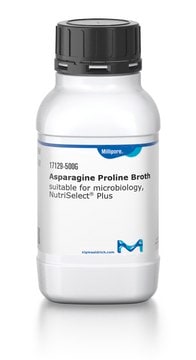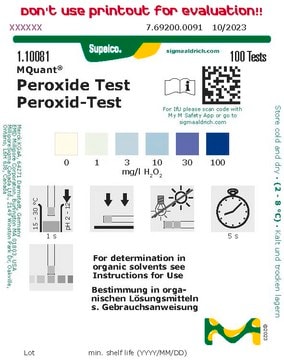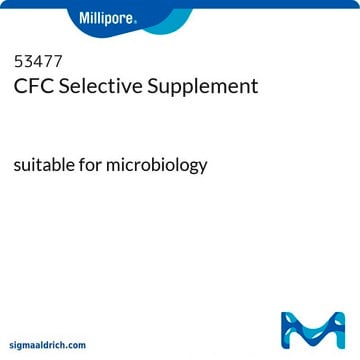00185
Acetamide Nutrient Broth
suitable for microbiology, NutriSelect® Basic
About This Item
Recommended Products
sterility
non-sterile
Quality Level
product line
BioChemika
form
powder
shelf life
limited shelf life, expiry date on the label
manufacturer/tradename
NutriSelect® Basic
technique(s)
microbe id | utilization test: suitable
final pH
7.0±0.2 (25 °C)
application(s)
bioburden testing
environmental
food and beverages
water monitoring
microbiology
suitability
selective by defined nutrients for Pseudomonas spp.
Application
Components
Part A (Cat. No. 62192-109.4-KC)
Magnesium sulfate 0.158g/L
Sodium chloride 0.2g/L
Sodium molybdate 0.005g/L
Ferrous sulfate 0.0005g/L
Dipotassium hydrogen phosphate 0.2g/L
Part B (Cat. No. 00160-390.6G-KC)
Acetamide 2.0g/L
Preparation Note
Dissolve 0.56 g Acetamide Nutrient Broth Part A and 2 g Acetamide in 950 ml distilled water. Check the pH and if necessary, adjust. Make up to 1 litre and pour into tubes. Autoclave at 121°C for 15 minutes.
Technique:
Medium is inoculated with a couple off loops from the culture to be assayed and it is incubated at 32-35°C for 24-48 hours before going to the isolation medium.
To confirm Ps. aeruginosa, inoculate a loop of culture in Asparagine Proline Broth (Cat. No. 17129) and incubate at 35-37°C for 24 hours. After this period, pour 1-2 drops of Nessler′s Reagent
(Cat. No. 72190) on to the culture and verify ammonia production: a change to yellow will mean ammonia production positive and therefore, Ps. aeruginosa presence.
Other Notes
Footnote
The designations basic, plus, or prime are added to indicate the quality control level, from basic quality control to standard QC plus to prime for full regulatory compliance.
Legal Information
Signal Word
Warning
Hazard Statements
Precautionary Statements
Hazard Classifications
Carc. 2
Storage Class Code
11 - Combustible Solids
WGK
WGK 1
Flash Point(F)
Not applicable
Flash Point(C)
Not applicable
Personal Protective Equipment
Choose from one of the most recent versions:
Already Own This Product?
Find documentation for the products that you have recently purchased in the Document Library.
Customers Also Viewed
Articles
An article concerning the detection, identification, differentiation, and cultivation of Pseudomonas species.
An article concerning the detection, identification, differentiation, and cultivation of Pseudomonas species.
An article concerning the detection, identification, differentiation, and cultivation of Pseudomonas species.
An article concerning the detection, identification, differentiation, and cultivation of Pseudomonas species.
Our team of scientists has experience in all areas of research including Life Science, Material Science, Chemical Synthesis, Chromatography, Analytical and many others.
Contact Technical Service












